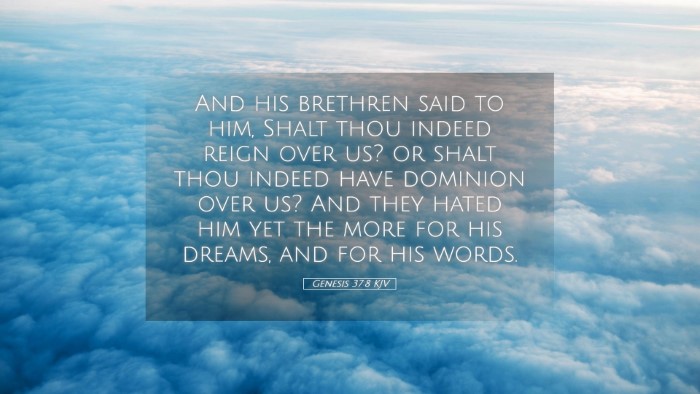Commentary on Genesis 37:8
Genesis 37:8 reads: "And his brethren said to him, Shalt thou indeed reign over us? or shalt thou indeed have dominion over us? And they hated him yet the more for his dreams and for his words."
Overview
This verse is situated within the narrative of Joseph, the favored son of Jacob. It showcases the deepening rift between Joseph and his brothers, highlighted by Joseph's dreams and the reaction they provoke. The inquiry of the brothers, whether Joseph will truly reign over them, reflects not only their jealousy but the theological implications of God's sovereignty in God's plan for Joseph's life.
Insights from Matthew Henry
Matthew Henry emphasizes the familial tension that exists in this verse. He notes:
- The Envy of the Brothers: Henry depicts how Joseph’s dreams incite anger and jealousy, marking a dangerous progression in sibling relationships.
- God's Plan: The response of the brothers illustrates the conflict between human emotion and divine purpose, revealing how God’s chosen paths can provoke animosity.
Henry reminds readers that jealousy can simultaneously blind individuals to God's work in others' lives, leading to destructive behavior.
Insights from Albert Barnes
Albert Barnes offers a theological depth in his commentary on this verse:
- The Nature of Joseph's Dreams: Barnes highlights the prophetic aspect of Joseph's dreams as revelations of his future supremacy over his family, which are met with skepticism and rejection.
- Prophetic Reactions: The hostility from his brothers reflects a common theme in scripture where prophetic figures face opposition. This foreshadows the eventual fulfillment of dreams that will come through struggle.
He further elaborates on the significance of dreams in the biblical narrative, often serving as instruments of divine communication that challenge existing power dynamics.
Insights from Adam Clarke
Adam Clarke’s commentary adds historical and cultural context:
- Sibling Rivalry: Clarke remarks on the prevailing customs of preference in families, which fuels Joseph's brothers' resentment towards him as the favorite son of Jacob.
- Expressions of Hatred: He details how the phrase "they hated him yet the more" implies a progression of animosity that culminates in tragic outcomes for Joseph later in the narrative.
Clarke asserts that this hatred is not merely emotional; it bears significant repercussions in God’s greater plan, highlighting the inevitable interplay between human sin and divine providence.
Theological Reflections
The verse invites several theological reflections:
- Divine Sovereignty: Joseph's dreams serve as a reminder that God's plans often unfold in unexpected ways, using the very animosities of those around us as part of His overarching narrative.
- Jealousy and its Consequences: The reaction of Joseph's brothers encapsulates the destructive nature of jealousy, which not only affects personal relationships but also leads to significant moral failures.
- Preparation for Leadership: Joseph’s experiences, beginning with this moment of confrontation, prepare him for future leadership, illustrating that struggle often preceeds greatness.
This account is not just about Joseph, but a reflection on the nature of God’s calling and the human responses it elicits, challenging readers to consider their own responses to divine purpose.
Applications for Today
For pastors, students, and theologians today, this verse offers critical lessons:
- Handling Jealousy: Leaders must be equipped to manage jealousy and resentment within their contexts, understanding it as a barrier to unity.
- The Role of Dreams and Visions: Contemporary Christian leaders can draw parallels from Joseph's dreams to discern how God communicates vision for their communities.
- Embracing God's Plan: This passage encourages individuals to trust God amidst familial or communal conflict, recognizing that opposition may serve a higher purpose.
- Intercessory Prayer: Just as Joseph faced opposition, Christians today are called to intercede for one another, fostering an environment of support rather than consanguine struggle.
Conclusion
In conclusion, Genesis 37:8 encapsulates a crucial point in Joseph's story and serves as a microcosm for examining human emotions in light of divine purpose. The wisdom gleaned from historical commentaries highlights the timeless relevance of scripture, inviting deeper contemplation and enriching faith practices today.


